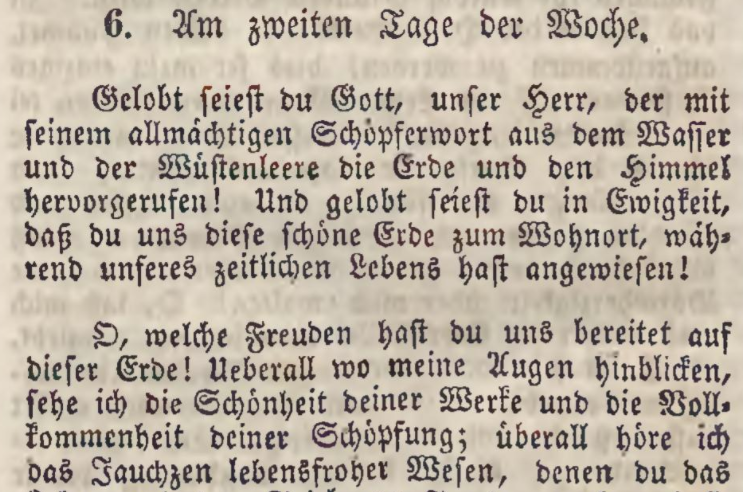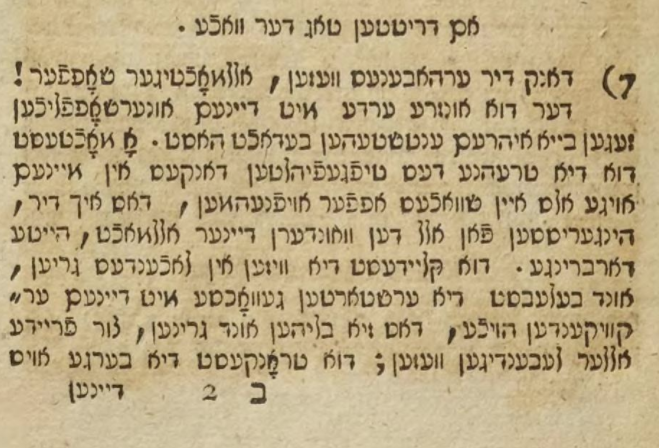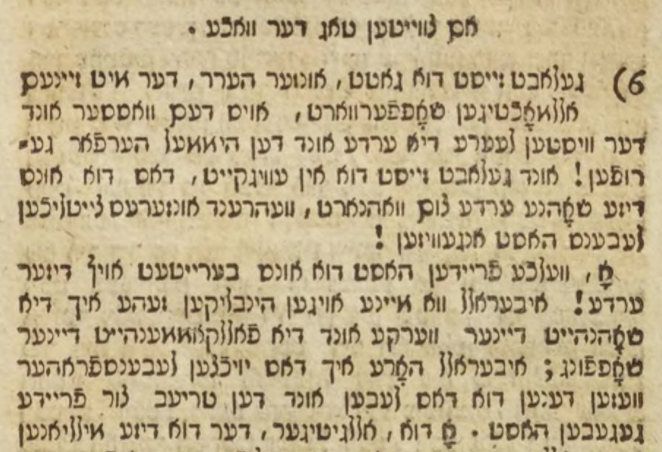| Source (German) | Translation (English) |
|---|---|
Am vierten Tag der Woche. |
On the fourth day of the week. |
Gelobt seiest du, Vater im Himmel, der du durch dein allmächtiges Herrscherwort die himmlischen Lichter ins Dasein gerufen hast, daß sie, wie die heilige Schrift erzählt, einen Unterschied machen zwischen Tag und Nacht, und dienen mögen zu Zeichen und Zeitbestimmungen, zu Tagen und Jahren. Wie gut und weise ist diese Eintheilung, wie so ganz deiner höchsten Ansicht angemessen. Denn so freundlich uns auch das Tageslicht zulächelt, und so süß es immer den Augen ist, so traurig wäre die Einförmigkeit des Lebens, wenn es nur einen langen Tag ausmachte, ohne Unterbrechung, ohne die wohlthätige Abwechslung der Nacht, die den Müden in die sanften Arme des Schlummers aufnimmt, daß er sich dadurch stärke zu neuer Thätigkeit und zu neuem Leben wieder erwache. |
Praise be to you, Father in heaven, who, by your almighty word of command, have called the heavenly lights into being, so that they, as the holy scripture tells us, make a difference between day and night, and may serve for signs and the determination of time, for days and years. How good and wise is this division, how completely appropriate to your highest view. For as friendly as the daylight smiles upon us, and as sweet as it always is to the eyes, so sad would be the monotony of life if it were only one long day, without interruption, without the beneficial alternation of the night, which takes the weary into the gentle arms of slumber, so that he thereby strengthens himself for new activity and awakens to new life again. |
Heiliger Gott, der du die Schicksale der Menschen mit deinem allsehenden Blick überschaust, wenn die Fäden derselben unsern Augen noch so verwickelt erscheinen, der du gnädig über uns wachst, wenn wir von der Tageslast und Mühe dem tiefen Schlaf bewußtlos in den Armen liegen. — O du, der du nicht schlummerst und nicht schläfst, Hüter Israels! sei unser Beschützer in dunkeln Nächten! Tag und Nacht sei unser Schirm und Schutz, und Tag und Nacht wollen wir deine Güte preisen. Wie der fromme König David sang: Des Tages befiehlt Gott seine Güte über mich, und des Nachts singe ich ihm des Dankes Lieder. |
Holy God, who overlooks the destinies of men with your all-seeing gaze, even when the threads of these appear so tangled to our eyes, who graciously watches over us when we lie unconscious in the arms of deep sleep from the day’s burden and toil. — O you who slumbers not and sleeps not, guardian of Israel! be our protector in dark nights! Day and night be our shield and protection, and day and night we will praise your goodness. As the pious King David sang: By day God commands his goodness upon me, and by night I sing to him songs of thanksgiving. |
O laß denen, die nagender Kummer und drückende Sorgen die müden Augenlieder offen halten, daß sie der Erholung des wohlthätigen Schlafes nicht froh werden können, lasse ihnen von deinen Höhen lindernder Balsam in das zerrissene Herz träuflen; laß einen Strahl deiner Gnade ihr Herz erfreuen, daß sie Hoffnung fassen, und froh in ihrem Berufe thätig sein mögen. |
O let those whose weary eyelids are held open by gnawing grief and oppressive sorrow, so that they cannot rejoice in the rest of pleasant sleep; let soothing balm from your heights be poured into their torn hearts; let a ray of your grace gladden their hearts, that they may take hope, and be gladly active in their occupation. |
Wende uns allen deinen gnädigen Blick zu, so fürchten wir uns nicht vor den Aengsten der Nacht, noch vor dem Pfeil, der am Tage schwebt, und der Pest die im Finstern schleicht. Deine Gnade macht uns die Nacht zum Tage, sie erhelle uns die Finsterniß der Erdenbahn und zeige uns den Weg zum ewigen Lichte. |
Turn your merciful gaze upon us all, and we will not fear the terrors of the night, nor the arrow that flies by day, nor the pestilence that creeps in darkness. Your grace turns night into day for us; it lights up the darkness of the earth’s path and shows us the way to eternal light. |
Unsers Gottes Freundlichkeit werde uns beschieden, so gelingt unser Händewerk, all unser Thun gelingt nur durch ihn. Amen. |
May the kindness of our God be granted to us, so that our handiwork will succeed, all our deeds will succeed only through him. Amen. |
“Am vierten Tag der Woche” was included by Yehoshua Heshil Miro in his anthology of teḥinot, בית יעקב (Beit Yaaqov) Allgemeines Gebetbuch für gebildete Frauen mosaischer Religion. It first appears in the 1829 edition, תחנות Teḥinot ein Gebetbuch für gebildete Frauenzimmer mosaischer Religion as teḥinah №8 on pp. 10-12. In the 1835 and 1842 editions, it also appears as teḥinah №8 on pp. 12-13. In a note to “Gebet am Tage der Gedächtnißfeier verstorbener Eltern, an deren Grabe zu sprechen” published in the 1835 edition, Miro records that Isaak Plessner sent this prayer to him, and from this we infer that its authorship may also be attributed to him.
We welcome corrections and improvements. The transcription of the German from Latin script in Fraktur type provided machine-readable text for a machine translation by DeepL, which we then edited for accuracy and clarity. –Aharon Varady
Source(s)



“Am vierten Tag der Woche | On the fourth day of the week, a teḥinah by Isaak Pleßner (1829)” is shared through the Open Siddur Project with a Creative Commons Attribution-ShareAlike 4.0 International copyleft license.










Leave a Reply